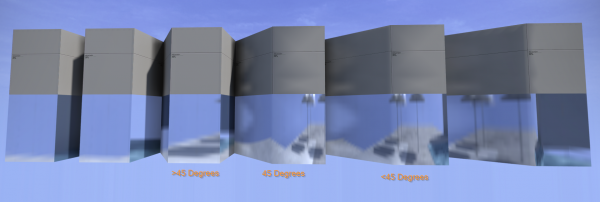Smoothing groups: Difference between revisions
Jump to navigation
Jump to search

No edit summary |
SirYodaJedi (talk | contribs) (aka "phong") |
||
| Line 1: | Line 1: | ||
{{stub}} | {{stub}} | ||
[[Image:Smoothing groups smoothing example.jpg|thumb|400px|right|The cylinder on the left is not smoothed.<br> The cylinder in the middle is smoothed with the default [[Lightmap#Scale|lightmap scale]] of 16.<br> The cylinder on the right is smoothed with a [[Lightmap#Scale|lightmap scale]] of 8.]] | [[Image:Smoothing groups smoothing example.jpg|thumb|400px|right|The cylinder on the left is not smoothed.<br> The cylinder in the middle is smoothed with the default [[Lightmap#Scale|lightmap scale]] of 16.<br> The cylinder on the right is smoothed with a [[Lightmap#Scale|lightmap scale]] of 8.]] | ||
'''Vertex Smoothing''' simply uses [[Vertex normal]]s ([[vector]]s) as if they were [http://en.wikipedia.org/wiki/Surface_normal Surface normals] to generate a kind of ''pseudo-''[http://en.wikipedia.org/wiki/Subdivision_surface subdivision surface] for the Lighting shader to work with. | '''Vertex Smoothing''' simply uses [[Vertex normal]]s ([[vector]]s) as if they were [http://en.wikipedia.org/wiki/Surface_normal Surface normals] to generate a kind of ''pseudo-''[http://en.wikipedia.org/wiki/Subdivision_surface subdivision surface] for the Lighting shader to work with. This is generally considered a form of [[phong]] shading, not to be confused [[$phong|phong speculars]]. | ||
When a number of adjacent surfaces are assigned to the same [[Smoothing group]], the ''Rendering Engine'' | When a number of adjacent surfaces are assigned to the same [[Smoothing group]], the ''Rendering Engine'' will "soften" the light and shadow across each vertex or edge shared by the group. This makes the geometry seem smoother when viewed from most angles. It does not soften the profile or silhouette of the object. | ||
==Guidelines== | ==Guidelines== | ||
* Brush geometry must be manually assigned to a Smoothing Group in Hammer. Model geometry smoothing data is configured in the [[model editor]] before [[SMD export]]. { | * Brush geometry must be manually assigned to a Smoothing Group in Hammer. Model geometry smoothing data is configured in the [[model editor]] before [[SMD export]]. { | ||
==Auto Smoothing== | ==Auto Smoothing== | ||
Revision as of 18:49, 27 November 2023

The cylinder on the left is not smoothed.
The cylinder in the middle is smoothed with the default lightmap scale of 16.
The cylinder on the right is smoothed with a lightmap scale of 8.
The cylinder in the middle is smoothed with the default lightmap scale of 16.
The cylinder on the right is smoothed with a lightmap scale of 8.
Vertex Smoothing simply uses Vertex normals (vectors) as if they were Surface normals to generate a kind of pseudo-subdivision surface for the Lighting shader to work with. This is generally considered a form of phong shading, not to be confused phong speculars.
When a number of adjacent surfaces are assigned to the same Smoothing group, the Rendering Engine will "soften" the light and shadow across each vertex or edge shared by the group. This makes the geometry seem smoother when viewed from most angles. It does not soften the profile or silhouette of the object.
Guidelines
- Brush geometry must be manually assigned to a Smoothing Group in Hammer. Model geometry smoothing data is configured in the model editor before SMD export. {
Auto Smoothing
- Some games, VBSP will auto smooth angles 45 degrees and under.
 Confirm:Any games other than CSGO?
Confirm:Any games other than CSGO?
